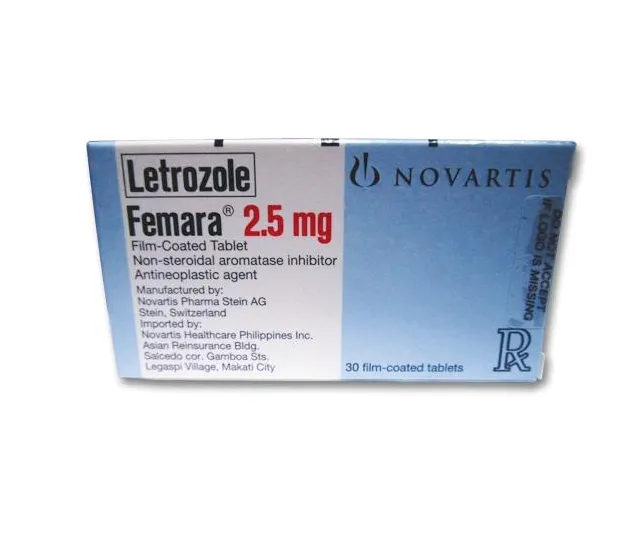Comprehensive Guide to Letrozole: Uses, Dosage, Side Effects, and More
What is Letrozole?
Overview of Letrozole
Generic Name: Letrozole
Brand Name: Femara, generics
Drug Group: Aromatase inhibitor (endocrine therapy)
Commonly Used For
- Treat breast cancer in postmenopausal women.
- Induce ovulation in infertility treatment.
- Manage endometriosis symptoms.
Key Characteristics
Form: Oral tablets (2.5 mg) (detailed in Dosage section).
Mechanism: Inhibits aromatase, lowering circulating estrogen levels.
Approval: FDA-approved (1997 for Femara) and EMA-approved for breast cancer.

Indications and Uses of Letrozole
Letrozole is indicated for a variety of endocrine and oncologic conditions, leveraging its estrogen-suppressing effects:
Breast Cancer (Early and Advanced): Treats hormone receptor-positive breast cancer in postmenopausal women, per oncology guidelines, supported by clinical trials showing a 30–40% reduction in recurrence risk compared to tamoxifen.
Ovulation Induction: Manages infertility in anovulatory women, improving ovulation rates, recommended in reproductive endocrinology protocols with evidence of higher pregnancy rates.
Endometriosis: Investigated off-label to reduce estrogen-driven endometrial growth, with gynecology studies.
Male Hypogonadism: Explored off-label to increase testosterone in men with low levels, with endocrinology research.
Gynecomastia: Managed off-label to reduce breast tissue in men, with urology-endocrinology data.
Ovarian Stimulation in IVF: Used off-label to enhance follicular development, with fertility medicine evidence.
Ductal Carcinoma In Situ (DCIS): Investigated off-label as adjuvant therapy, with oncology studies.
Bone Metastases: Applied off-label to control estrogen-sensitive bone lesions, with palliative care research.
Polycystic Ovary Syndrome (PCOS): Initiated off-label to induce ovulation in resistant cases, with endocrinology data.
Adrenal Insufficiency Support: Explored off-label in rare cases to manage estrogen-related symptoms, with endocrine studies.
Dosage of Letrozole
Dosage for Adults
Breast Cancer (Early or Advanced):
- 2.5 mg once daily, taken with or without food, for 5 years as adjuvant therapy, or until disease progression in advanced cases.
Ovulation Induction:
- 2.5 mg once daily from days 3–7 of the menstrual cycle, with dose adjustments (up to 5–7.5 mg) if ovulation does not occur, for up to 5 cycles under specialist supervision.
Endometriosis (Off-Label):
- 2.5 mg once daily for 3–6 months, with monitoring for bone health.
Dosage for Children (Off-Label Use)
Pubertal Gynecomastia:
- 2.5 mg once daily for 6 months, adjusted based on testosterone levels, under pediatric endocrinology oversight.
Dosage for Pregnant Women
Pregnancy Category X: Contraindicated due to fetal harm; consult an obstetrician if pregnancy occurs during therapy.
Dosage Adjustments
Renal Impairment: Mild to moderate (CrCl 30–60 mL/min): No adjustment; severe (CrCl <30 mL/min): Use with caution and monitor closely.
Hepatic Impairment: Mild (Child-Pugh A): No adjustment; moderate to severe (Child-Pugh B or C): Reduce to 2.5 mg every other day due to reduced clearance.
Concomitant Medications: Adjust if combined with tamoxifen or estrogen-containing therapies, which may counteract effects; monitor efficacy.
Elderly: No specific adjustment; assess bone density and liver function regularly.
Menopausal Status: Confirm postmenopausal status before initiating; avoid in premenopausal women unless ovarian suppression is confirmed.
Additional Considerations
- Take this active ingredient at the same time daily, with or without food, to maintain consistent levels.
- Use calcium and vitamin D supplements as recommended to mitigate bone loss.
- Monitor ovarian function in infertility patients to optimize dosing cycles.
How to Use Letrozole
Administration:
- Oral: Swallow tablets whole with a glass of water, taken with or without food.
- Avoid crushing or chewing tablets to ensure proper absorption.
Timing: Take once daily, preferably in the morning or evening, as prescribed.
Monitoring: Watch for hot flashes, joint pain, or signs of liver issues (e.g., jaundice); report changes immediately.
Additional Tips:
- Store at 15–30°C (59–86°F), protecting from moisture and light.
- Keep out of reach of children; dispose of unused tablets per local regulations.
- Use a pill organizer for adherence, especially during infertility cycles.
- Schedule regular bone density scans (e.g., DEXA) every 6–12 months during long-term therapy.
- Educate patients on recognizing symptoms of estrogen deficiency (e.g., vaginal dryness) and seeking support.
Contraindications for Letrozole
Hypersensitivity: Patients with a known allergy to Letrozole or other aromatase inhibitors.
Pregnancy: Contraindicated (Category X) due to teratogenic effects on the fetus.
Premenopausal Women: Avoid unless ovarian function is suppressed, due to increased estrogen levels.
Severe Hepatic Impairment: Contraindicated in Child-Pugh Class C due to reduced metabolism.
Severe Renal Impairment: Contraindicated in CrCl <30 mL/min due to potential accumulation.
Uncontrolled Osteoporosis: Avoid in patients with severe bone loss without prior management.
Concurrent Estrogen Therapy: Contraindicated with estrogen-containing drugs due to antagonistic effects.
Side Effects of Letrozole
Common Side Effects
- Hot Flashes (20–40%, managed with cooling measures)
- Joint Pain (15–25%, relieved with physical therapy)
- Fatigue (10–20%, improves with rest)
- Headache (5–15%, controlled with hydration)
- Nausea (5–10%, reduced with food)
These effects may subside with adaptation.
Serious Side Effects
Seek immediate medical attention for:
- Bone: Osteoporosis or fractures from prolonged use.
- Hepatic: Jaundice, hepatitis, or liver failure.
- Cardiovascular: Myocardial infarction or stroke (rare).
- Endometrial: Abnormal uterine bleeding or cancer risk.
- Allergic: Rash, angioedema, or anaphylaxis (rare).
Additional Notes
Regular monitoring with DEXA scans every 12 months and liver function tests every 3 months is advised.
Patients with a history of cardiovascular disease should be monitored for ischemic events.
Report any unusual symptoms (e.g., chest pain, severe joint swelling) immediately to an oncologist.
Long-term use (>5 years) requires annual gynecologic exams to assess endometrial health.
Warnings & Precautions for Letrozole
General Warnings
Bone Loss: Risk of osteoporosis and fractures; monitor bone mineral density (BMD) annually.
Liver Dysfunction: Risk of hepatotoxicity; check liver enzymes (ALT, AST) every 3 months.
Hypercholesterolemia: Risk of elevated lipids; monitor cholesterol levels regularly.
Fatigue: Common side effect; assess for underlying causes if severe.
Cardiovascular Events: Rare risk of ischemic events; monitor in at-risk patients.
Additional Warnings
Endometrial Changes: Rare risk of endometrial cancer; perform pelvic ultrasounds if abnormal bleeding occurs.
Cognitive Impairment: Reported memory issues; monitor in elderly patients.
Hot Flashes: Frequent side effect; manage with non-hormonal therapies if needed.
Renal Impairment: Risk of accumulation; adjust dose in moderate cases.
Hypersensitivity Reactions: Rare anaphylaxis or rash; discontinue if severe.
Use in Specific Populations
- Pregnancy: Category X; avoid and use contraception during therapy.
- Breastfeeding: Contraindicated; avoid due to potential infant harm.
- Elderly: Higher risk of bone loss; initiate calcium and vitamin D supplementation.
- Children: Use off-label only under specialist supervision.
- Renal/Hepatic Impairment: Adjust or avoid based on severity.
Additional Precautions
- Inform your doctor about liver disease, osteoporosis, or pregnancy plans before starting this medication.
- Avoid alcohol to reduce liver strain during therapy.
- Use weight-bearing exercise to support bone health.
Overdose and Management of Letrozole
Overdose Symptoms
- Nausea, dizziness, or hot flashes.
- Severe cases: Severe fatigue, liver injury, or profound estrogen suppression.
- Headache, weakness, or confusion as early signs.
- Coma or cardiovascular collapse with extremely high doses.
Immediate Actions
Contact the Medical Team: Seek immediate medical help if overdose is suspected.
Supportive Care: Monitor vital signs, provide hydration, and manage symptoms (e.g., antiemetics for nausea).
Specific Treatment: No specific antidote; supportive care with liver function monitoring.
Monitor: Check liver enzymes, estrogen levels, and BMD for 24–48 hours; consult an endocrinologist if needed.
Patient Education: Advise against doubling doses and to store securely.
Additional Notes
- Overdose risk is low with oral use; systemic effects are rare but possible.
- Report persistent symptoms (e.g., yellowing skin, severe weakness) promptly.
Drug Interactions with Letrozole
This active ingredient may interact with:
- Estrogen-Containing Drugs: Reduces efficacy (e.g., hormone replacement therapy); avoid combination.
- Tamoxifen: May counteract effects; monitor response.
- CYP2A6/CYP3A4 Inhibitors: Increases levels (e.g., ketoconazole); adjust dose if needed.
- Cholesterol-Lowering Drugs: Enhances lipid effects; monitor levels.
- Warfarin: Rare effect on INR; monitor closely.
Action: Provide your healthcare provider with a complete list of medications.
Patient Education or Lifestyle
Medication Adherence: Take this aromatase inhibitor as prescribed for breast cancer or infertility, following the daily schedule.
Monitoring: Report joint pain, hot flashes, or signs of liver issues immediately.
Lifestyle: Engage in weight-bearing exercise; avoid smoking to protect bones.
Diet: Increase calcium and vitamin D intake; limit alcohol.
Emergency Awareness: Know signs of liver failure or fractures; seek care if present.
Follow-Up: Schedule regular check-ups every 3–6 months to monitor bone density and liver function.
Pharmacokinetics of Letrozole
- Absorption: Oral, peak at 1–2 hours; bioavailability ~99%.
- Distribution: Volume of distribution ~1.9 L/kg; 60% protein-bound.
- Metabolism: Hepatic via CYP2A6 and CYP3A4 to inactive metabolites.
- Excretion: Primarily renal (90% as metabolites); half-life 2–4 days.
- Half-Life: 2–4 days, with steady-state at 2–6 weeks.
Pharmacodynamics of Letrozole
This drug exerts its effects by:
Inhibiting aromatase, reducing estrogen synthesis by up to 98% in postmenopausal women.
Suppressing tumor growth in hormone-sensitive breast cancer.
Inducing ovulation by lowering estrogen feedback inhibition.
Exhibiting dose-dependent risks of bone loss and lipid changes.
Storage of Letrozole
- Temperature: Store at 15–30°C (59–86°F); protect from moisture and light.
- Protection: Keep in original container, away from heat and humidity.
- Safety: Store in a secure location out of reach of children and pets due to hormonal risk.
- Disposal: Dispose of unused tablets per local regulations or consult a pharmacist.
Frequently Asked Questions (FAQs)
Q: What does Letrozole treat?
A: This medication treats breast cancer and infertility.
Q: Can this active ingredient cause hot flashes?
A: Yes, hot flashes are common; use cooling measures.
Q: Is Letrozole safe for children?
A: Yes, off-label with supervision.
Q: How is this drug taken?
A: Orally as tablets, once daily.
Q: How long is Letrozole treatment?
A: Typically 5 years for breast cancer, or 5 cycles for infertility.
Q: Can I use Letrozole if pregnant?
A: No, it is contraindicated; consult a doctor.
Regulatory Information
This medication is approved by:
U.S. Food and Drug Administration (FDA): Approved in 1997 (Femara) for breast cancer.
European Medicines Agency (EMA): Approved for breast cancer and infertility.
Other Agencies: Approved globally for endocrine therapy; consult local guidelines.
References
- U.S. Food and Drug Administration (FDA). (2023). Femara (Letrozole) Prescribing Information.
- Official FDA documentation detailing the drug’s approved uses, dosage, and safety.
- European Medicines Agency (EMA). (2023). Letrozole Summary of Product Characteristics.
- EMA’s comprehensive information on the medication’s indications and precautions in Europe.
- National Institutes of Health (NIH). (2023). Letrozole: MedlinePlus Drug Information.
- NIH resource providing detailed information on the drug’s uses, side effects, and precautions.
- World Health Organization (WHO). (2023). WHO Model List of Essential Medicines: Letrozole.
- WHO’s consideration of Letrozole for cancer treatment.
- Journal of Clinical Oncology. (2022). Letrozole in Breast Cancer.
- Peer-reviewed article on Letrozole efficacy (note: access may require a subscription).
